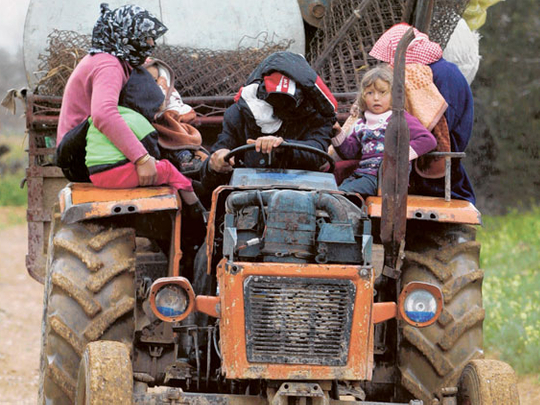
Reyhanli After days of relentless shelling and sniper attacks, thousands of Syrian refugees are streaming across the border into Turkey with horrific accounts of mass graves, massacres and burned-out homes.
The latest reports of escalating violence fuelled accusations that President Bashar Al Assad is rushing to stamp out as much of the year-old uprising as he can before a UN-brokered ceasefire today.
The trigger for the new waves of refugees was an offensive in Idlib province, which borders Turkey and has become increasingly rebellious against the Al Assad regime.
Activists reported hundreds dead in various villages throughout the province.
A photograph provided to The Associated Press by a Syrian activist showed at least a dozen corpses wrapped in blankets in what appeared to be a mass grave in Taftanaz. The AP could not verify the authenticity of the photograph, but witnesses also described a mass grave.
"They destroyed the whole village," a refugee who asked to be identified by only one name, Anas, told the AP after fleeing Killi. "If he has to kill, Bashar would even kill 1 million people. He doesn't care."
Hikmet Saban, another Syrian refugee who reached Turkey, described the devastation in Taftanaz, located several miles outside the city of Idlib.
"Helicopters and tanks are bombarding continuously," he told Turkey's state-run Anadolu agency. "Taftanaz has been burnt to the ground for three days." Activists posted video they said showed a helicopter gunship firing a missile at Taftanaz and a mosque hit by shelling.
The escalating violence has dimmed hopes that the fighting, which the UN says has killed more than 10,000 people, will end anytime soon. The country appears to be spiralling toward civil war — a fearsome development that could bring a regional conflagration.
A vital geopolitical linchpin, Syria borders five other nations and has close ties to Iran and powerful militant groups, such as Lebanon's Hezbollah.
Al Assad last week accepted a ceasefire deadline brokered by international envoy Kofi Annan, which calls for his forces to pull out of towns and cities by today and for everyone to lay down their arms by 6am local time on Thursday. But the prospect of a ceasefire looked increasingly dim, with no let-up in violence around the country where forces loyal to President Bashar Al Assad have battled to crush a popular revolt against his rule for more than a year.
In a last-minute move, Al Assad has demanded written guarantees from opposition fighters that they put down their weapons, prompting Turkey's Deputy Foreign Minister Naci to say that the April 10 deadline was now effectively void.
Ahmad, a refugee from Taftanaz who, like other witnesses, asked only to be identified by his first name, said families were forced to bury the dead in a "collective grave."
He said the shelling stopped only when the soldiers needed more ammunition.
"The humanitarian truce promised by the Annan plan? If they grant us a two-hour truce, it would be to let us leave our houses, and then they would shoot again," he said.
‘Catastrophic'
Fadi Al Yassin, an activist in Idlib province, said Syrian troops took control of Taftanaz on Thursday after three days of intense shelling and attacks.
He said 95 people were killed in the attack, including 37 who were burned beyond recognition. He also said the dead were buried in mass graves.
"The situation is catastrophic in Taftanaz," he said. "The grand mosque was destroyed and about 200 homes heavily damaged."
He added that troops have now left the village, taking up positions around it.
The stream of Syrians fleeing to Turkey has picked up considerably, with about one third of the total refugees arriving in the past two weeks. Some 2,500 crossed the border on Thursday alone, said Ankara's Foreign Minister Ahmet Davutoglu, adding that the daily flow has doubled since Syria promised last week to abide by the truce.
Davutoglu told UN Secretary-General Ban Ki-moon on Friday his country would seek UN assistance if the influx continues. Turkey has in the past floated the idea of creating a small buffer zone inside Syria if refugee flows become overwhelming.
"We are doing our best to shelter them in camps, temporary housing units. No one is left out," Davutoglu said. "But everyone should realise that there is a problem here. We will ask for humanitarian assistance when needed."












